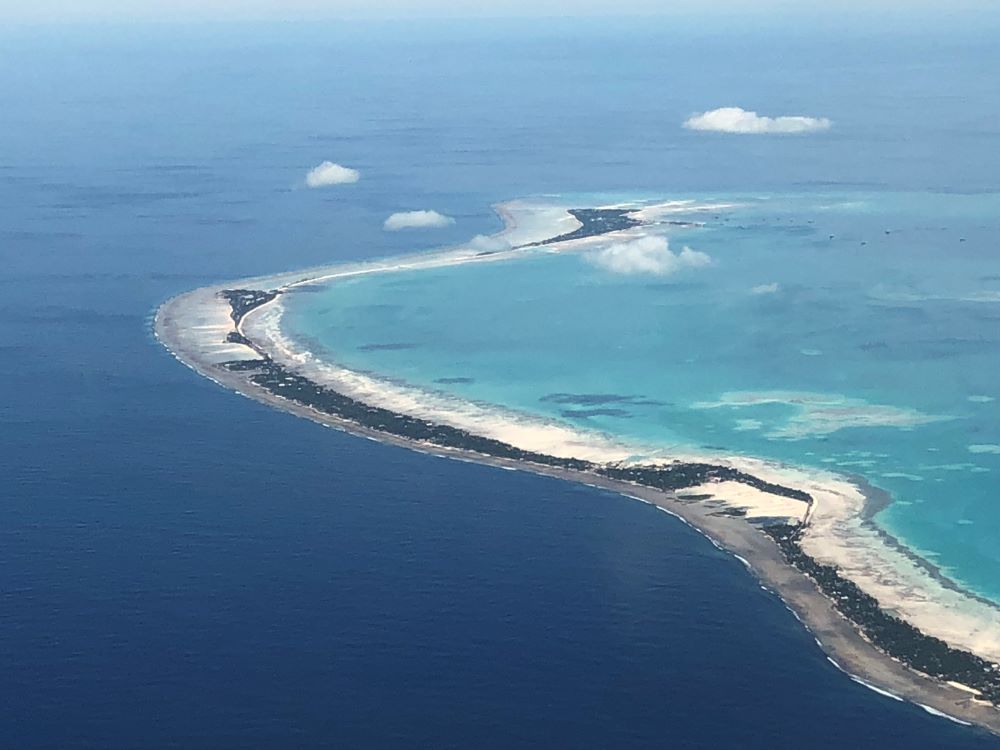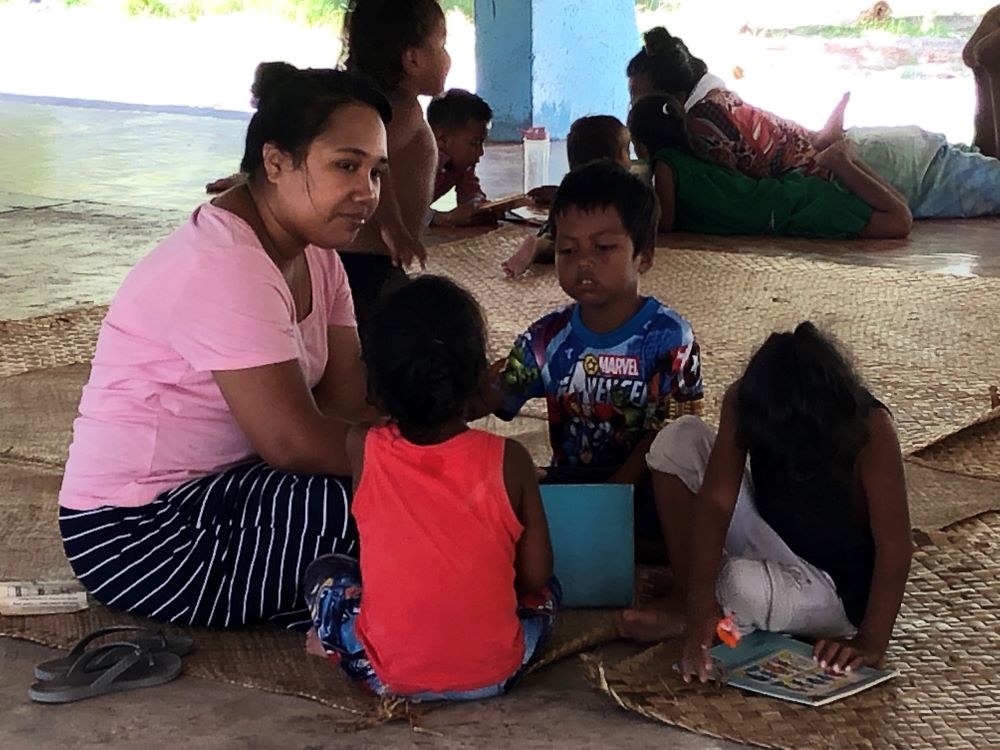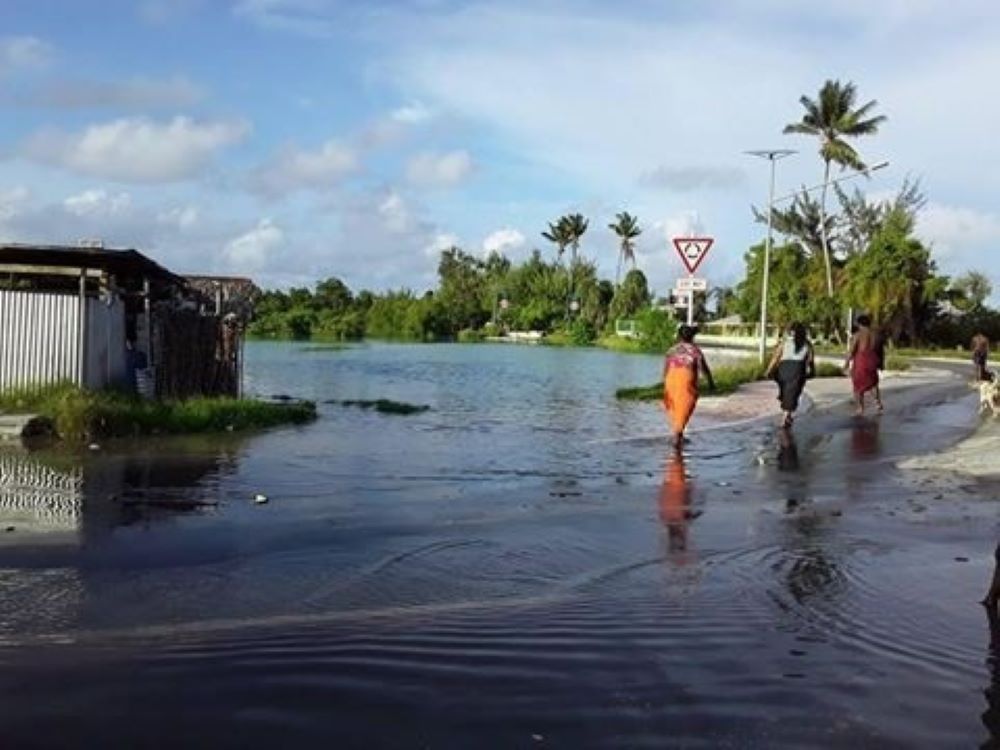Good Samaritan Srs. Katarina Kabiriera and Taabeia Ibouri made their first profession Sept. 26, 2020, but COVID-19 restrictions have kept them in Australia. The community has ministered in Kiribati since 1991. (Courtesy of Meg Kahler)
In "Creating Space for the Future" — a recent address to Leadership Conference of Women Religious annual assembly — Sr. Mercedes Casas Sánchez said, “Creating spaces for hope involves discovering the seeds of the future that are present here and now … Creating spaces for the future does not mean something strange will befall us, but rather what belongs to us will blossom and bear fruit.”
Thirty years ago, Good Samaritan Sisters took the seeds of life and mission to the coral atoll of Kiribati. (An atoll is a ring-shaped coral reef that surrounds an island.) The sisters were invited to Kiribati in 1991 by Bishop Paul Mea, and it is probably fair to say that most of us had never heard of the small Pacific nation, let alone knew where it was. We also probably never considered the gift and challenge of being Good Samaritan Sister in a country facing so many challenges with so few resources.

The view of Kiribati from an arriving plane (Courtesy of Meg Kahler)
Kiribati continues to find itself on the world stage as a country impacted by climate change. It is constantly challenged by the economics, politics and isolation of the Pacific region. Yet our small group of sisters has navigated their way courageously and safely through many challenging situations including — like most places on the planet — the recent challenges of COVID-19.
In the last five years, there have been many developments. The Good Samaritan Early Childhood Centre at Abaokoro is now a government-registered center. With the generous support of Sts. Peter and Paul in Bulimba, Australia, the center has expanded to include a new school building and toilet block. The sisters have upgraded their qualifications, with two sisters teaching and a third sister as director.

Sr. Taabeia Ibouri reads with students at the Good Samaritan Early Childhood Centre at Abaokoro, a government-registered center. (Courtesy of Meg Kahler)
The community in Temaiku is preparing to move into a new house, built on the same site and near the sea. It is a significant upgrade from their current accommodation. The building projects have been impacted by COVID-19 restrictions. The government of Kiribati has kept the country COVID-free by closing the borders; no one has been able to come into or leave Kiribati for nearly 18 months, except on government charter flights. This has meant that building advisers have done much of their work through phone calls and "phone walks" around the site. It has also slowed the arrival of materials.
While some projects have slowed, the sisters continued to develop their ministries. One sister is a lecturer at Kiribati Teachers College and another is teaching at the Kiribati School and Centre for Children with Special Needs. One sister spent time in Australia taking a formation course and has returned to Kiribati with a role in formation, looking after the young women enquiring into life as a Good Samaritan sister as well as volunteering and supporting other ministry activities. COVID restrictions have meant that the two most recently professed Kiribati women are still in Australia.
In a recent conversation with the sisters about Good Samaritan life in Kiribati for 30 years, they shared what they saw as the gift of the way of life here. They value the opportunity to spread the Gospel through a different charism and live their faith in a new way. Apart from their formal ministry, the sisters have found opportunities to minister to people who are sometimes excluded from Kiribati society. For many years the sisters, and a band of faithful companions, have visited the hospital for people with mental illness and run the Faith and Light group for adults with disabilities.
In more recent years, the sisters have established a presence in Kiribati's prisons, which has led to opportunities to connect with the families of prisoners. Another sister has begun visiting the hospital to provide spiritual care for patients. They visit the sick, elderly, grieving and disabled in their homes. Both communities have people who come seeking their assistance in many ways — an expanding ministry of hospitality.
Advertisement
The sisters also spoke of their personal journeys as Good Samaritan Sisters. They have deeply valued the gift of discovering the Good Samaritan spirituality and finding their life within it. One sister said: "It supports my inner world and expands my outer world … the opportunity to live outside Kiribati has helped me to know my own country better." She added: "Being in Australia I learnt about the diversity of cultures, people, situations, life and learnt new skills.”
Another sister commented: “I feel that my life has been formed well, valued and nurtured to become who I am now as an SGS with a passion for teaching."
The sisters see their ministry — wherever they are — as an opportunity to care for and support people through charitable work, and to bring joy and peace to their lives.
The communities in Kiribati have grown and developed with the support of many people, though there have been no visitors or Australian sisters living in Kiribati for the last 18 months. The communities have missed gathering with the teacher and parish groups who had been visiting, as well as sisters who gave retreats and assisted with various projects.

Flooded streets are common in Kiribati. The Good Samaritan Sisters support initiatives to combat climate change, including mangrove planting, rubbish recycling and composting. (Courtesy of Meg Kahler)
The next few years will continue to pose challenges for Kiribati. The sisters are mindful of the impact of climate change and have supported many initiatives, such as mangrove planting, rubbish recycling and composting. When the building projects are complete, the sisters would like to support the local communities learning to grow a wider variety of food and to improve their diet, as diabetes continues to be a significant health issue in the country.
Good Samaritan life in Kiribati is a gift to every sister in our community. It is an example of the charism of finding new ways to bring life. Everyone who shares in that spirit — no matter where they live — is enriched. The future of the nation of Kiribati is difficult to predict and will require courageous decisions soon: Kiribati will need the assistance of Pacific neighbors. Our Good Samaritan communities are uniquely placed to accompany their Kiribati families, friends and neighbors into the future.
The seeds continue to take root and grow in this small Pacific country!




